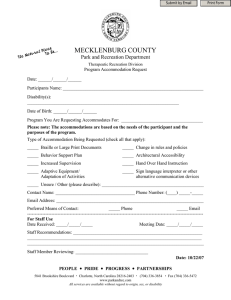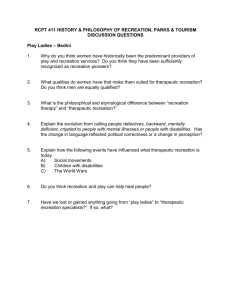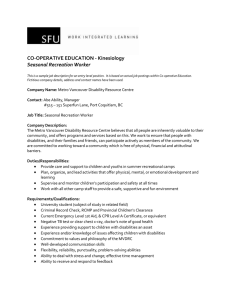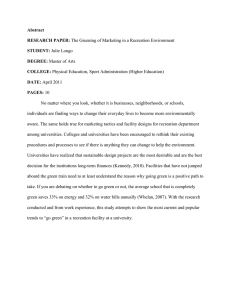RTM 204
advertisement
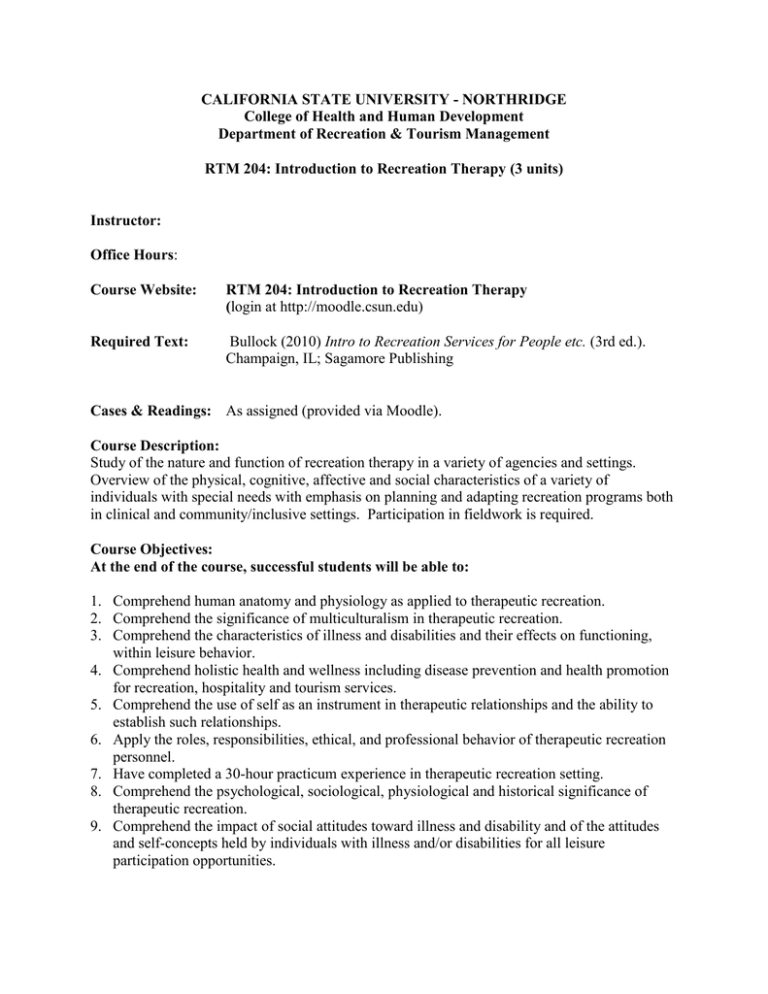
CALIFORNIA STATE UNIVERSITY - NORTHRIDGE College of Health and Human Development Department of Recreation & Tourism Management RTM 204: Introduction to Recreation Therapy (3 units) Instructor: Office Hours: Course Website: RTM 204: Introduction to Recreation Therapy (login at http://moodle.csun.edu) Required Text: Bullock (2010) Intro to Recreation Services for People etc. (3rd ed.). Champaign, IL; Sagamore Publishing Cases & Readings: As assigned (provided via Moodle). Course Description: Study of the nature and function of recreation therapy in a variety of agencies and settings. Overview of the physical, cognitive, affective and social characteristics of a variety of individuals with special needs with emphasis on planning and adapting recreation programs both in clinical and community/inclusive settings. Participation in fieldwork is required. Course Objectives: At the end of the course, successful students will be able to: 1. Comprehend human anatomy and physiology as applied to therapeutic recreation. 2. Comprehend the significance of multiculturalism in therapeutic recreation. 3. Comprehend the characteristics of illness and disabilities and their effects on functioning, within leisure behavior. 4. Comprehend holistic health and wellness including disease prevention and health promotion for recreation, hospitality and tourism services. 5. Comprehend the use of self as an instrument in therapeutic relationships and the ability to establish such relationships. 6. Apply the roles, responsibilities, ethical, and professional behavior of therapeutic recreation personnel. 7. Have completed a 30-hour practicum experience in therapeutic recreation setting. 8. Comprehend the psychological, sociological, physiological and historical significance of therapeutic recreation. 9. Comprehend the impact of social attitudes toward illness and disability and of the attitudes and self-concepts held by individuals with illness and/or disabilities for all leisure participation opportunities. 10. Comprehend the role of the therapeutic recreation profession as an advocate for leisure, human rights and services for individuals with illness and disabilities. 11. Apply programming concepts, including conceptualization, planning, implementation, and evaluation as applied to therapeutic recreation services. 12. Apply basic individual and group techniques related to therapeutic recreation programming. 13. Apply a variety of assistive techniques, adaptive devices, equipment, and facility design related to specific illness and disabilities in therapeutic recreation services. 14. Successfully plan, implement and evaluate a one-day inclusive recreation program for both able-bodies individuals and individuals with disabilities. 15. Comprehend the roles and contributions of the client, family and significant others in the therapeutic recreation process. 16. Select their best work in the course for inclusion in the Student Portfolio Notebook. Recreation and Tourism Management B.S. Program Learning Outcomes: 1. Students will demonstrate critical thinking including analysis, synthesis and application in the fields of recreation, play, leisure, parks, hospitality and/or tourism through a variety of pedagogies. 2. Students will practice and self-assess progress toward mastery of the standards and competencies of appropriate accrediting bodies through continual self-assessment and portfolio development. 3. Students will demonstrate application and integration of theoretical knowledge in a practical setting through a minimum of 400 hours of professional internship in preparation for pursuing employment. 4. Students will demonstrate an increase in Emotional Intelligence while pursuing their degree objectives. Course Requirements: This class is based on student participation & discussion, assigned readings, projects, case studies, and other supplementary materials. To fully benefit from this class, students should keep up with the assigned readings and in-class presentations. Class discussions facilitate the exchange and understanding of ideas and concepts. This will not be possible if students come to class unprepared. 1. Recreation Therapist Certified (RTC/CTRS) Interview- 40 points Each student is required to interview a “Recreation Therapist Certified” (RTC) and/or “Certified Therapeutic Recreation Specialist” (CTRS). A list of RTC’s in the area is provided from the approved practicum agency list for therapeutic recreation majors. Appointments, professional appearance and conduct are required. 2. Disability Experience – 30 points You will select either: 1) CVA/ Stroke 2) Totally Blind. You will be the chosen disability for approximately one hour. This must be accomplished at one time. It may not be broken into segments. 3. Client/ Resident/ Consumer Observations – 30 points You are required to make 3 typed written observation reports during the semester. These observations are to take place at your volunteer practicum agency/facility. 4. Practicum Experience– 30 points Each student is required to volunteer a minimum of 30 hours (there are no exceptions) which must be completed by the end of the semester. This experience can be either paid or volunteer but must be in an agency/ facility with a Recreation Therapist. 5. One Hour Group Program with Program Plan and Evaluation– 30 points One Hour Group Program with Program Plan and Evaluation. 6. Therapeutic Recreation Journal or Article Critique – 30 points Critique one research article from the Therapeutic Recreation Journal OR one current newspaper or professional magazine article about a person with a disability or by a person with a disability relating to recreation. 7. Disability Interview Paper & Summary– 30 points Conduct face to face interview with a person with disability. 8. PowerPoint Presentation ADA/ ADAAG/ Universal Design/ Going Green– 30 points Site visitations, evaluate (utilizing ADA/ Seven Principles of Universal Design and Going Green) and take pictures of three existing facilities/buildings. Recommendations on how to improve to be effective and efficient. Evaluation: Recreation Therapist Certified (RTC/CTRS) Interview Disability Experience Client/ Resident/ Consumer Observations Practicum Experience One Hour Group Program with Program Plan and Evaluation Therapeutic Recreation Journal or Article Critique Disability Interview Paper & Summary PowerPoint Presentation ADA/ ADAAG/ Universal Design/ Going Green TOTAL Grading A 90-100% 16% 12% 12% 12% 12% 12% 12% 12% 100% B C D 80-89% 70-79% < 69% COURSE CALENDAR* l. Introduction to Therapeutic Recreation A. History of Therapeutic Recreation 1. Social attitudes towards disabilities and self-concepts held by individuals with disabilities. 2. Psychological, sociological, physiological and historical significance of therapeutic recreation. II. Programming and Leadership Skills A. Observational techniques and demonstration B. Therapeutic Recreation Program Planning Process 1. Client assessment 2. Developing goals and objectives 3. program implementation 4. Program evaluation C. Leadership techniques III. Disabilities A. Physical disabilities B. Developmental disabilities C. Psychological disabilities D. Aging IV. Practical Applications A. Class group presentations B. Practicum field experiences (30 hour minimum) and related assignments The extended course calendar will be available on MOODLE. The calendar will be modified on Moodle as the semester progresses. This syllabus is subject to change. It is the student’s responsibility to keep track of changes provided through Moodle. Course Policies and Guidelines: 1. Students’ participation is vital to successful learning. Therefore, students are expected to attend the class regularly, arrive on time, take notes, complete reading assignments on schedule, and actively participate in discussions and other learning activities. 2. In order to create a safe, welcoming, and productive learning environment, students are expected to respect each other, the facilities and equipment. Abusive, violent, disrespectful or disruptive behavior will not be tolerated. Students are referred to the policies and regulations section of the University Catalog for university policies and code of conduct information. 3. Cellular phones, pagers and other electronic devices not being used for instructional purposes should be kept off during class. 4. If you miss class, make arrangements with peers to collect class information, announcements and materials. Information will not be repeated for those who are tardy or absent. 5. Communication: Students are expected to have access to their CSUN email account. The instructor will send class announcement to students via students’ official CSUN emails. If you have a primary email that is not your CSUN account, please have your CSUN email forwarded to your primary email. 6. Late Assignment: Late assignments will be accepted with a penalty of 15% off per day. Assignments submitted more than three days late will not be accepted without prior arrangement with the instructor. No assignments will be accepted after the last official day of class. 7. Make-up Work: Make-up assignments or exams will be given only when students meet the following conditions: i. Absences caused by hospitalization, death in the family, or other emergencies must be documented within 48 hours of your return to class. Acceptable documentation includes a letter from a physician, a newspaper obituary, or a memorial service program. ii. Absences for official University activities (e.g., athletics, band, and chorus) must be documented and approved in advance. Please contact the instructor if you have any questions regarding your eligibility to make up for an assignment. 8. Academic Honesty: According to the University’s policy on academic honesty, no form of academic of dishonesty will be tolerated. Any student found cheating, plagiarizing a written assignment, or committing any other infraction against CSUN’s policy will either receive a failing grade for the course, be referred for University disciplinary action, or both. Please refer to www.csun.edu/a&r/soc/studentconduct.html for additional information. 9. Students are advised to consult with campus services to receive assistance if they have concerns regarding skills in areas such as writing or studying or computer skills. 10. Students are encouraged to be proactive and seek out the instructor as soon as they have any concerns about the class or their performance. The end of the semester is too late to take action to bring up a grade. 11. All assignments must be typed, double spaced, 12-point font, 1 inch margins and should follow the American Psychological Association (APA) style (6th ed.). 12. Microsoft Word is the ONLY acceptable document format for online or email submission. The following format should be used when naming the file: Course number_last name_first name_short title (for example: RTM550_xie_jimmy_syllabus). STUDENT RESOURCES Disability Resources and Educational Services (DRES). In keeping with the University’s policy, reasonable accommodation is provided for students with disabilities that might affect their course participation or assignment completion. Any student with disabilities should contact DRES at 818-677-2684 or dres@csun.edu. DRES is located in Bayramian Hall room 110 (BH 110). Please visit www.csun.edu/dres/index.php for additional information and/or assistance. The National Center on Deafness (NCOD) is located on Bertrand Street in Jeanne Chisholm Hall and can be reached at (818) 677-2611.You are not required to disclose your disability to me in order to receive accommodation during this course. Learning Resource Center (LRC) and Writing Center. The LRC is committed to helping students become better writers, critical thinkers, and communicators by providing face-to-face and electronic consultation, tutorials, reference manuals, and links to Web writing resources. As part of the LRC, the Writing Center staff is available to help students during the conception, research, drafting, or revision stages of a paper. Students may visit the Writing Center in Bayramian Hall room 408 (BH 408) or call 818-677-2033 to make an appointment. Walk-ins are available on a limited basis. For additional information and/or assistance, please visit www.csun.edu/lrc. University Counseling Services (UCS). Students sometimes experience significant confusion and distress when trying to manage school, work, relationships, and family responsibilities. UCS provides free and confidential consultations to help students deal with academic stress, relationship problems, family/roommate conflicts, personal growth, crisis events (e.g., rape, divorce, assault) and other mental health issues (e.g., anxiety, depression, suicidal ideation). Students may visit UCS in Bayramian Hall room 520 (BH 520) or call 818-677-2366 (V), 818677-7834 (TTY) for an appointment. UCS is located on the web at www.csun.edu/counseling.

